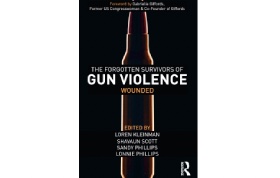A collection of personal essays written by gun violence survivors has been published today (31st May), describing life after the incident and after the public eye has turned away.
The Forgotten Survivors of Gun Violence collects 20 accounts of survivors from various shootings, including school shootings, home invasions and domestic violence.
Life after tragedy
So far this year alone there have been more than 230 mass shootings in the United States and more than 7,200 deaths to gun violence, according to data. That equates to more than 50 deaths a day.
But on top of the tragic number of deaths, there are a staggering number of people wounded by guns – 38,550 in 2022 according to the same data. This new book tells a lesser-told narrative of what happens to these survivors.
In the book’s foreword, written by former Congresswoman Gabrielle Giffords, who is the co-founder of Giffords, an organiza¬tion dedicated to saving lives from gun violence, she says she fears Americans have become numb to gun violence.
She explains: “Storytelling is one the most important tools we have for combatting this numbness Stories like those in this collection, where survivors bear physical and emotional wounds for all to see, dare us not to look away. If we view this crisis only in statistics, we will forget the human toll of gun violence.”
The personal accounts detail some of the troubling after-effects of gun violence, from physical rehabilitation, mental health issues, social isolation and the financial burden of injuries and loss.
The impact beyond the injuries
The Forgotten Survivors of Gun Violence depicts the physical and emotional consequences of gun violence for its victims.
One of the book’s editors, author Loren Kleinman explains the motivation behind the book, to demonstrate that emotional and psychological scars of gun violence are just as significant as the physical ones – and much more far-reaching.
Kleinman suggests that every American has been affected in some way.
“We habitually look for easy access to exits at concert halls. We scan the crowd in shopping malls, grocery stores, and churches for suspicious-looking people who might be armed,” she explains. “Anxiety disorders in the general population are increasing dramatically, and mass shootings are one reason for this.”
A recent international analysis showed that more than 70% of mass shootings in developed countries happen in the U.S.
Kleinman adds: “Mass shootings have changed how we move through the world and caused collective reverberations of trauma in our society. The best way we can support survivors is to be present with them, listen, attune to their feelings, and never judge their reactions to their experiences.”
The families and friends
The Forgotten Survivors of Gun Violence also puts a spotlight on the effect that gun violence has on families and friends of victims.
It tells of loved-ones longing for closure – and in some cases struggling to make sense of what happened, when no arrests are made and the reasons for the attack are never known.
One mother, whose daughter was shot and killed by an armed intruder, says: “We were victimized twice by not knowing who killed our daughter and never having an opportunity to find justice for her.
“Where a bullet enters is not always where it stays. That bullet goes through everyone who loves that person. That bullet makes a giant hole in the hearts and minds of those left living.”
Although some of the survivors in the book will never regain the ability to live independently, with some needing assistance to breathe, eat or perform daily tasks, the editors are keen to point out the strength and resilience of survivors.
Kleinman says: “This book is also of hope, of retaliation, of taking a place in the world after having their autonomy robbed.”
Further information:
Wounded: The Forgotten Survivors of Gun Violence
Edited By Loren Kleinman, Shavaun Scott, Sandy Phillips, Lonnie Phillips
Published 30 June 2023
106 Pages
Paperback: 9781032436234 | $31.96 USD | £23.99
Hardback: 9781032436241 | $128 USD | £96
About the editors:
Loren Kleinman’s coverage of gun violence appeared in the Independent, New York Magazine (The Cut), The Rumpus, The New York Daily News, and more. She is the co-editor of If I Don’t Make It: I Love You: Survivors in the Aftermath of School Shootings (2019). She is the editor of the anthology Indie Authors Naked and the co-edited collection with Amye Archer My Body, My Words, which Bustle named one of the “11 New Feminist Books That Could Totally Change Your Year.” Her short film, Suffering Is the Easy Part, directed and produced by Jaime Ekkens, is distributed by Seed&Spark and Docademia.
Shavaun Scott has been a psychotherapist and writer since 1991 and has worked with thousands of clients who have been victims or perpetrators of violence. She is particularly interested in trauma recovery and violence prevention and enjoys sharing stories of uncommon bravery and unconventional paths. She practices in both Oregon and California.
Sandy Phillips and Lonnie Phillips founded the organization Survivors Empowered after the slaughter of their daughter, Jessica Redfield Ghawi, and 11 others in the Aurora Colorado Theater Mass Shooting in 2012. Their original non-profit, Jessi’s Message, has grown into Survivors Empowered—a national organization created By Survivors, For Survivors, Empowering Survivors. Sandy and Lonnie’s story appeared in the documentary Under The Gun by Katie Couric and was featured in Lisa Ling’s This is Life on CNN. They’ve also been highlighted by media such as This American Life, Anderson Cooper, 60 Minutes, and more.




